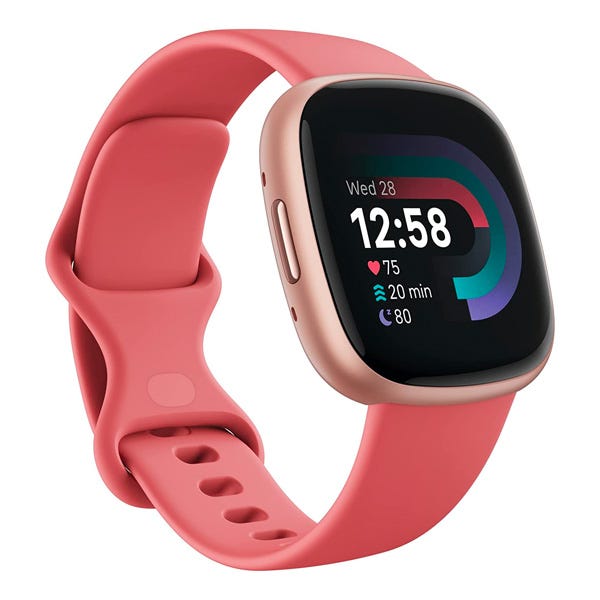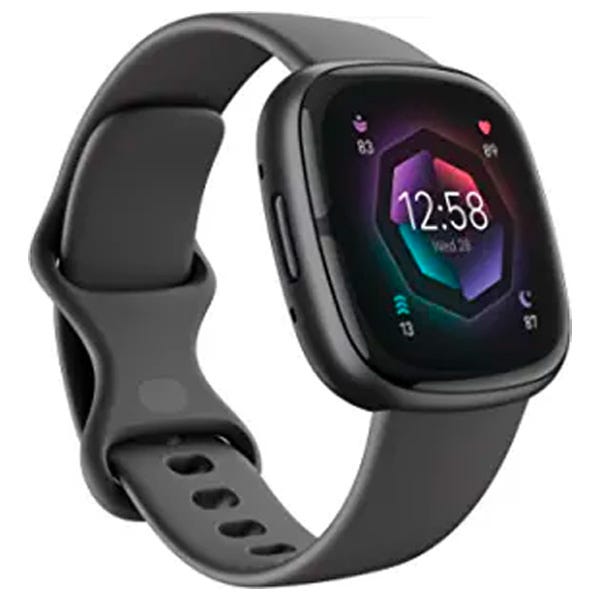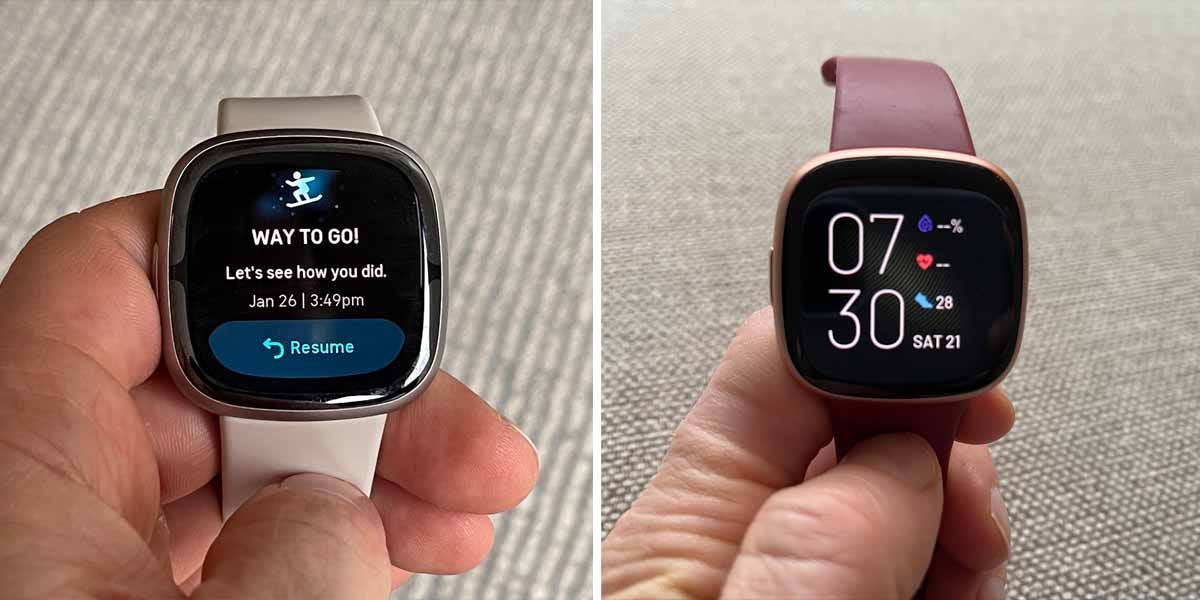When you buy through our links, Insider may earn an affiliate commission. Learn more
The list of the best Fitbit devices is led by two distinct flagships: the Fitbit Versa 4 and the Fitbit Sense 2. Although they offer a similar experience as some of the best fitness trackers to buy, there are a few clear differences that set them apart.
Namely, the Sense 2 offers a few extras than the Versa 4, including ECG readings, skin temperature sensing, and real-time stress tracking. This is in addition to offering everything else found on the Versa 4, and it has a price tag of just $300.
Meanwhile, the Versa 4 doesn’t include Fitbit’s latest health sensors. It’s also $100 less. However, due to minimal upgrades over Fitbit’s older-gen Versa 3, and some connectivity and tracking issues I came across during testing, it’s hard to recommend the Versa 4 to anyone, especially someone choosing between it and the Sense 2.
Below is a comparison of these two Fitbit smartwatches to see exactly how they stack up and, ultimately, why the Sense 2 is the better option.
Fitbit Sense 2
Fitbit’s Sense 2 is great for health-focused users who want a quality smartwatch experience coupled with in-depth insights into their sleep habits and stress levels.

Fitbit Versa 4
The Fitbit Versa 4 disappoints as a fourth-generation smartwatch as it lacks third-party app support, has issues with fitness tracking, and doesn’t allow for music storage.
Fitbit Sense 2 vs. Fitbit Versa 4: Specs at a glance
Fitbit Sense 2 vs. Fitbit Versa 4: Design
Both the Sense 2 and the Versa 4 are near-identical clones of one another and feature a similar design to the generations that came before. Each has the same square watch face with subtle, rounded edges, as well as a display size of 336 x 336 pixels.
Other similarities include a water-resistance rating of 50 meters and the ability to use the same interchangeable watch bands. They both also have a small side button that can be used in conjunction with the watch’s touchscreen controls.
One area where they do differ, however, is with their case size. While the Versa 4 measures 40.4mm, the Sense 2’s case size is 40.5mm. Although this is technically a difference in size, it’s so minimal that it’s hard to notice which watch is which when they’re sitting next to each other.
There’s also a significant difference regarding the available colors of both wearables. The Versa 4 comes in Graphite, Platinum, and Copper Rose, while the Sense 2 comes in Shadow Grey, Lunar White, and Soft Gold.
Winner: Tie
Fitbit Sense 2 vs. Fitbit Versa 4: Smartwatch performance
One of the nitpicks I have with these watches is their disappointing lack of smartwatch capability. Specifically, neither watch supports third-party app access nor do they allow for any music storage or playback via something like Spotify (i.e. a third-party app). Each of these is (or should be) a hallmark of modern smartwatches.
Because of this, the Sense 2 and Versa 4 both come up short concerning actual smartwatch performance. Sure, they get notifications like text messages, emails, and phone calls, but these are the absolute bare minimum you’d expect to find on any wearable in the “smart” category, which is where they reside in Fitbit’s lineup.
Additionally, they both only offer Amazon Alexa voice assistance support, not Google Assistant, which is strange considering Google owns Fitbit. Alexa works fine on both watches, though a smartphone does need to be tethered to either for the feature to work.
Winner: Tie
Fitbit Sense 2 vs. Fitbit Versa 4: Health and fitness tracking
The biggest difference between the Versa 4 and the Sense 2 comes down to their individual health and fitness tracking performance. And although the Versa 4 is designed to be more of a legit fitness tracker, it’s the Sense 2 that proves to be the more reliable active wearable.
I often found that the Sense 2 connected to a GPS signal far quicker than the Versa 4, which would have a major impact on the fitness tracking data I’d see at the end of a workout. Waiting for the Versa 4 to connect was often a frustrating experience, yet it was always imperative to do so to ensure accurate tracking.
During the Versa 4 tests, I decided to forgo the GPS connection before a few runs and found that the tracking accuracy was off by as much as 1/8th of a mile. Though it seems minimal, that difference had a significant impact on my mile time.
Here’s why: Let’s say the Versa 4 logs you at around a 9-minute mile. If you factor in the 1/8th of a mile discrepancy, you might’ve run that mile in closer to 8 minutes. That’s a big difference for anyone training for a marathon or any sort of running event. I never encountered this issue with the Sense 2.
The Sense 2 is also a much better health tracker, too. In addition to its new skin temperature sensor, it offers real-time stress tracking via a cEDA sensor as well as an ECG app. The ECG app is especially interesting as it’s capable of tracking heart rhythms and can assess for signs of Afib. While only a doctor can diagnose Afib, the ECG app can at least detect potential signs of it.
Standard tracking features like heart rate, blood oxygen levels, menstrual cycles, and heart rate variability are also available on both the Sense 2 and Versa 4.
Winner: Sense 2
Fitbit Sense 2 vs. Fitbit Versa 4: Battery life
Perhaps the best feature native to both the Sense 2 and the Versa 4 is their battery life, which lasts roughly six days depending on how it’s used. During testing, I consistently hit the six-day estimate, even during periods when I used the GPS often (which could tend to make the battery drain a little quicker).
Compared to something like the best Apple Watch, which often requires a daily recharge, the extended battery life of the Sense 2 and Versa 4 is a major benefit. I also like that both watches only need around 12 minutes on the charger to go from 0% to a full day’s worth of battery life.
Winner: Tie
Which should you buy?
The Sense 2 and Versa 4 are similar watches that mostly represent the Fitbit experience. However, due to the Versa 4’s shortcomings in both smarts and fitness tracking, it pales in comparison to the Sense 2. This is exactly why we’ve tabbed it as not only one of the best Fitbits but also one of the best fitness trackers and best Android smartwatches.
That’s not to say the Sense 2 is without its faults. A lack of third-party app support, or the ability to store or play music, holds it back from being a truly great smartwatch. What ultimately gives it the edge over the Versa 4 is its better GPS connectivity, its new skin temperature-sensing and stress-tracking features, and access to the ECG apps and heart rhythm data.
However, if those advanced features aren’t something you need or necessarily care about, then I recommend opting for the more impressive Versa 3 instead, as opposed to the Versa 4. You can likely find it for cheaper than the Versa 4, plus it’s just a better overall wearable.
Overall winner: Sense 2


Read the full article here





